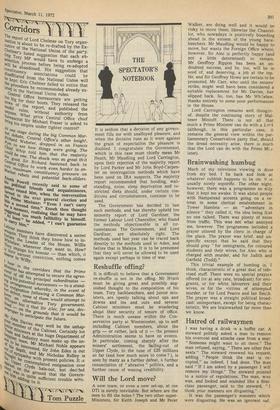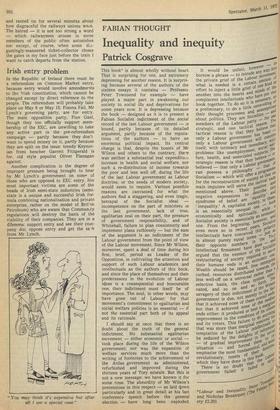THE SPECTATOR'S NOTEBOOK
It is seldom that a decision of any government fills me with unalloyed pleasure, and when the decision runs as it were against the grain of expectation the pleasure is doubled. I congratulate the Government, which in this case must chiefly mean Mr Heath, Mr Maudling and Lord Carrington, upon their rejection of the majority report by Lord Parker and Mr John Boyd-Carpenter on interrogation methods which have been used on IRA suspects. The majority report recommended that hooding, wahstanding, noise, sleep deprivation and restricted diets should, under certain conditions and circumstances, continue to be used.
The Government has decided to ban such methods, and has thereby upheld tne minority report of Lord Gardiner, the former Labour Lord Chancellor, who found the methods objectionable in all cir cumstances. The Government, and Lord Gardiner, are absolutely right. The methods used last year can be traced back directly to the methods used in Aden, and before that in Malaya. It is to be presumed that they will never be allowed to he used again except perhaps in time of war.
Reshuffle offing?
It is difficult to believe that a Government re-shuffle is not in the offing. Mr Heath must be giving great and possibly anguished thought to the composition of his team. Tory backbenchers, and junior ministers, are openly talking about ups and downs and ins and outs and several Cabinet ministers must be wondering abont their security of tenure of office. There is much unease within the Conservative party at Westminster, up to anti including Cabinet members, about the grip — or rather, lack of it — the present Administration seems to have on events. In particular, coming sharply after the miners' settlement, the bailing-out of Upper Clyde, to the tune of £35 millions so far (and how much more to come ? ), is seen by many as a further defeat, a further renunciation of " abrasive " politics, and a further cause of waning credibility.
Will the Lord move?
A new team, or even a new set-up, at the DTI is surely inevitable. But where are the men to fill the holes ? The two other superMinisters, Sir Keith Joseph and Mr Peter Walker, are doing well and it would be risky to move them; likewise the Chancellor, who nowadays is positively bounding ahead in the esteem of the young bacxbenchers. Mr Maudling would be happy to move, but wants the Foreign Office where, however, Sir Alec is perfectly happy (and not a little determined) to remain. Mr Geoffrey Rippon has been an undoubted success, and he, too, will be in need of, and deserving, a job at the top. He, and Sir Geoffrey Howe are certain to be promoted. Mr Carr, who until the miners' strike, might well have been considered a suitable replacement for Mr Davies, has slipped back. So, too, has Mr Wh!telaw, thanks entirely to some poor performances in the House.
Lord Carrington remains well thoughtof, despite the continuing story of Malteser Mintoff. There is not all that much a Prime Minister can do with a Lori (although, in this particular case, it remains the general view within the parliamentary Conservative party that, should the dread necessity arise, there is much that the Lord can do with the Prime Mi.,ister).
Brainwashing humbug
Much of my television viewing is done from my bed, I lie back and look at whatever rubbish happens to be on: it is usually nicely soporific. The other night, however, there was a programme so sidy that it kept me awake. It was about people with Hampstead accents going on a re treat in some clerical estabishment in Tower Hamlets — an "adventure in silence" they called it, the idea being that no one talked. There was plenty of noise from traffic. This was not what annoyed me, however. The programme included a prayer uttered by the cleric in charge of the place. The prayer was brief, and unspecific except that he said that they should pray "for immigrants, for coloured students and their wives, for Alec who is charged with murder, and for Judith and Garfield (Todd)."
This trivial example of humbug is, I think, characteristic of a great deal of televised stuff. There were no special prayeis offered (or at any rate, broadcast) for emigrants, or for white labourers and their wives, or for the victims of attempted murder, or for Lord Pearce and Ian Smith. The prayer was a straight political broadcast: unimportant, except for being characteristic. We are brainwashed far more than we know.
Hatred of railwaymen
I was having a drink in a buffet car. A steward politely asked a man to remove his overcoat and attache case from a seat: "Someone might want to sit there." The man refused, saying, "There are other free seats" The steward renewed his request, adding "People think the seat is occupied," as indeed, I had done. The man said "If I am asked by a passenger I will remove my things." The steward pointed to a notice of regulations. The man, wao was, and looked and sounded like a firstclass passenger, said to the steward, "I think your manners are disgusting."
It was the passenger's manners which were disgusting. He was an ignorant oaf, and ranted on for several minutes about how disgraceful the railways unions were. The hatred — it is not too strong a word — which railwaymen arouse in some members of the public often astonishes me: except, of course, when some di.;gustingly-mannered ticket-collector closes the gates in my face just before the train I want to catch departs from the station.
Irish entry problem
In the Republic of Ireland there must be a referendum on Common Market entry, because entry would involve amendmelts to the Irish constitution, which cannot be changed except by direct reference to the people. The referendum will probably take place on May 8 or May 15. Fianna Fail, Mr Lynch's governing party, are for entry. The main opposition party, Fine Gael, though they too officially support membership of the EEC, are unwilling to take any active part in the pre-referendum campaign — partly because they don't want to spend money on it, partly because they are split on the issue: trendy Keynesian front bencher Garrett Fitzgerald is for, old style populist Oliver Flanagan against. Another complication is the degree of improper pressure being brought to bear by Mr Lynch's government on some uf those who are opposed to EEC entry. His most important victims are some of the heads of Irish semi-state industries (semistate is a unique and successful Irish formula combining nationalisation and private enterprise, rather on the model of Brit'sn Petroleum) who are aware that Commumty regulations will destroy the basis of the viability of their companies. They are in a dilemma: support entry and see their coinpany die; oppose entry and get the sa-..k from Mr Lynch.











































 Previous page
Previous page